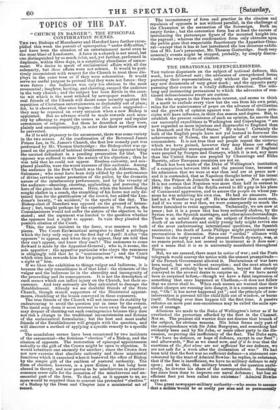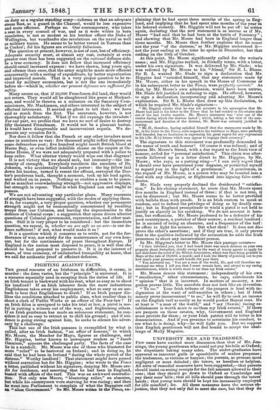THE IRRATIONAL DEFENCELESSNESS.
THE various disputants on the subject of national defence, this week, have followed suit; the advocates of strengthened forces pursuing their representations, only without the production of any new documents of very great mark ; and the opposite party pursuing their course in a totally different direction. The side- long and insinuating persuasions to which the advocates of con- tinued defencelessness resort are curious.
One who argues in the Free-trade interest, and seems to think it a merit to exclude every view but the one from his own point, relies for the maintenance of peace on the advance of civilization and the growth of opinion against war. Doubtless these prin- ciples will have influence, in their due season and degree. But, to establish the present existence of such an opinion, he asserts that our successful expeditions to Washington and Copenhagen " are now regarded as more injurious and disgraceful to England than to Denmark and the United States." By whom ? Certainly the bulk of the English people have not yet learned to forswear the achievements of Nelson, the most popular of all our victorious commanders. It is not true that our people repent the victories which we have gained, however they may blame our official rulers for impolitic management of war. And even if England were peopled by Sturges and Gurneys, which it is not, any more than the United States are peopled by Channings and Elihu Burritts' other European countries are not so. Much has been made of the Duke of Wellington's institution of a comparison between 1804 and the present time, because of his admission that we were at war then end are at peace now : and it is contended, that as Napoleon thought better of his intent then, the Prince: de Joinville would do so now. Non sequitur. It is not certain that Napoleon was more than half in earnest in 1804'; the collection of the flotilla served to fill a gap in his plans of Continental aggression, and to amuse the people on whose pas- sions he was achieving his own rise. He had no steamers. He hadnot a Waterloo to pay off. He was shrewder than most men. And if we were at war then, we were-consequently so much the better furnished to resist aggression. Technically, we are now at peace ; but it is a peace that has been seriously shaken, by the Syrian war, the Spanish marriages, and other misunderstandings. There is an actual dispute on the subject of Switzerland; the death of an unfortunate and sickly young lady might revive one of the most embarrassing international questions, the Spanish succession ; the death of Louis Philippe might precipitate many provocatives to dissension. Since our "cordial" alliance with France in the early years of the present French dynasty, war, at no remote period, has not seemed so imminent as it does now ; and a sense that it is so is universally manifested throughout Europe.
But, we are assured, there must be notice of war ; and the Paris telegraph would convey the notice with the utmost promptitude— if the French Government allowed it. Declarations of war have been usual, but not without exception; and the next attack on England will probably be without notice, beyond that already conveyed in the avowed desire to surprise us. If we have never been so surprised before,—though we have a faint impression of something that once happened at Chatham,—it does not follow that we never shall be. When rash nurses are warned that their infant charges are running into danger, it is a common answer to say, " Oh ! it has never happened yet"; and the principle of non- intervention is pursued till the child falls out of window, or burns itself. Nothing ever does happen till the first time. A passive reliance on mere past non-occurrence may be called the wile spe- cies of courage.
Allusions are made to the Duke of Wellington's letter as if he
overlooked the protection afforded by the fleet in the Channel. Not so. The prudent old warrior does not discuss that branch of the subject, for obvious reasons. His letter forms only part of the correspondence with Sir John Burgoyne, and something had evidently been said by Sir John, or some dher party to the dis- cussion, respecting the inefficiency of the fleet. The Duke says, " We have no defence, or hope of defence, except in our fleet"; and afterwards, " But as we stand now, and if it be true that the exertions of the feet alone are not sufficient for our defence, we are not safe for a week after the declaration of war." He had been told that the fleet was no sufficient defence—a statement cor- roborated by the tract of Admiral Bowles: he replies, in substance, that if the fleet is insufficient, we have no military defence to rely upon ; and to that, the military branch of the question exclu- sively, he devotes his share of the correspondence. Something has since been done to improve our naval defences; has an efficient fleet yet been called into existence ? Admiral Bowles says not. One great newspaper-military authority—who seems to assume that a militia Would be as costly per man and as permanently on duty as a regular standing army—informs us that an adequate steam fleet, as a guard in the Channel, would be less expensive and more efficient. Perhaps so. Our contemporary, who takes a seat in every council of- war, and as it were writes in born epaulettes, is not so modest as his brother officer the Duke of Wellington, but vouchsafes also revelations on the naval as well as military topics. He seems to be better versed in Torrena than in Cocker ; for his figures are evidently fallacious.
The question at present, however, is not of cost, but of efficiency. Adequate security must, at almost any cost, certainly at even greater cost than has been suggested on the rational defence side, be a true economy. It does not follow that increased efficiency should entail increased expense : we have shown, long years ago, and oftener than once, that the army mightbe made more efficient concurrently with a saving of expenditure, by better organization and improved morale. That is a very proper question to be re- vived by military economists, but is not the one immediately before us—which is, whether our present defences are sufficient for safety. Many assure us, that if 50,000 Frenchmen did land, they would not return. They would all be slaughtered like geese at Michael- mas, and would be thrown as a nuisance on the Sanatory Com- missioners, Mr. Mackinnon, and others interested in the subject of effectual interment. It needed no ghost to tell that ; we have said as much from the first. The assurance, however, is not thoroughly satisfactory. What if we did expunge the invaders ? For our part, we profess that we have no sort of desire to destroy fifty thousand Frenchmen. It would not be a pleasant battue. It would have disagreeable and inconvenient sequels. We de- precate any occasion for it. Nor does it follow that the French or any other invaders must come in numbers so vast : five thousand might inflict disgrace on some defenceless post ; five hundred might insult British blood at Herne Bay, or even inflict indelible shame on the empire at Os- borne House, if we were not adequately prepared with a police to keep order. What ulterior victory would wipe out that disgrace? It is not victory that we should seek, but immunity—the im- munity of. strength. Everybody recollects the anecdote of Dr. Johnson, who accidentally hustled a porter : the big fellow laid down his burden, turned to resent the affront, surveyed the Doc- tor's ponderous back, thought a moment, took up his load again, and walked on in peace. Nothing so enables a man to be peace- ful as manifest overwhelming strength—not aggressive displays, but strength in repose. That is what England can and ought to
possee ss. r - W are not advocating anyparticular plans. Many.resources of strength have been suggested, with the modes of applying them. It is, for example, a very jr'roper question, whether our permanent strength might not be economically concentrated by recalling troops from our Colonies, and leaving the dependencies to the defence of Colonial corps : a suggestion that opens divers ulterior questions of Colonial government, representation, and other mat- ters. Still it is very proper to be considered : but the immediate question, we repeat, is, whether we are safe as we are—is our de- fence sufficient ? if not, what would make it so ? It is a question which it concerns us to settle, not for the fur- therance of war, nor solely for the maintenance of our own hon- our, but for the continuance of peace throughout Europe. If England is the nation most disposed to peace, it is well that she should be best prepared to preserve it. It is in the interest of peace, of true economy, of undisturbed tranquillity at home, that we call for authentic proof of efficient defences.



























 Previous page
Previous page